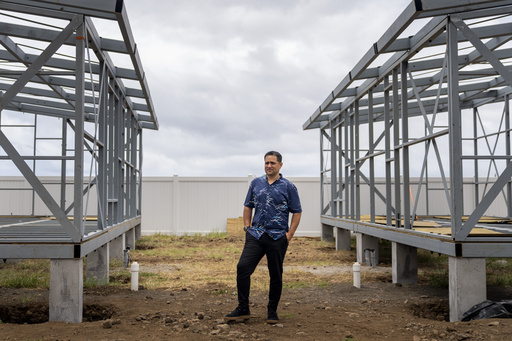
WAILUKU, Hawaii — Tamara Akiona cherished the vibrant atmosphere of her home in Lahaina, which she shared with ten family members and friends. The bustling four-bedroom residence, inherited from her grandparents, buzzed with activity. She fondly recalls the excitement of hearing the front door open, always wondering who would return home. The kitchen was a constant hub of cooking, neighbors would drop by to share garden produce, and the children would eagerly chase the shave ice man down the street.
However, the August 2023 fires in Maui tragically altered that lively setting. The Akiona home was amongst the nearly 1,900 residential structures destroyed, resulting in at least 102 fatalities and displacing 12,000 individuals. Tamara and her husband now reside in a modest two-bedroom condo in Wailuku, about 40 minutes from their original neighborhood. Tamara emphasized her desire to keep her uncle, Ron Sambrano, close by during this transition, encapsulating her sentiment with a reference to the Disney film “Lilo and Stitch” — “Nobody’s left behind.”
Following the catastrophic fires, estimates indicate that about one-third of the people forced from their homes found temporary refuge with friends and relatives. This arrangement surfaced as a practical solution amidst Hawaii’s ongoing housing shortage and the island culture that values family and generosity. However, the sudden increase in household size has posed challenges, both financially and emotionally.
The Akiona family and others in similar situations received aid from a groundbreaking relief initiative. The Council for Native Hawaiian Advancement (CNHA) introduced the Host Housing Support Program, which provides stipends of $500 per displaced individual, up to $2,000 monthly, for a year. This program exemplifies a supportive approach that aligns with cultural values, aiding communities in staying cohesive while addressing the need for temporary housing.
“Each major fire brings mass displacement, leading most people to stay with family or friends for extended periods,” noted Jennifer Gray Thompson, CEO of the disaster advocacy organization After The Fire. “Yet, up until now, that arrangement never came with financial support.”
Shortly following the fires, the CNHA discovered a significant number of those displaced were opting to stay with loved ones instead of the temporary hotel shelters accommodating roughly 8,000 individuals, mainly due to high rental costs and personal choices.
“It’s normal in Hawaii to rely on friends and family during tough times,” said Kuhio Lewis, CEO of a local nonprofit. “This is truly part of Hawaii’s vibrant culture, which embodies the aloha spirit.”
Acknowledging the critical nature of these informal living arrangements, CNHA quickly integrated this strategy into its disaster recovery efforts. Initially starting a small pilot program in October 2023, the initiative began paying households $375 per individual for six months. Both hosting families and guests underwent a vetting process, ensuring compatibility and safety through interviews and home inspections.
With further contributions from the Hawaii Community Foundation and the American Red Cross, the monthly stipend increased to $500 and was extended to 12 months, amounting to a $2.5 million investment that aided 672 displaced individuals in 253 host households.
These funds were vital for the Akiona family, assisting them in managing new expenses such as the condo association fees while commuting back to Lahaina. The financial relief came at a crucial time as Tamara’s job managing a vacation rental slowed and her husband, Kawehi, found himself in need of a second job but suffered a knee injury.
Their improved financial stability allowed them to provide support for Tamara’s uncle, who experienced the trauma of watching his community burn during the fires. Ron noted the comfort of living with his niece and nephew: “They’re doing their best to help me out and just make things work,” he said, acknowledging it as a blessing, as he could have faced homelessness otherwise.
Traditionally, disaster assistance has focused on helping survivors find temporary housing like hotels or rentals, but the unique approach of compensating hosts has yet to be employed widely in the United States. This method offers numerous benefits that extend beyond mere shelter, as noted by Gray Thompson. Keeping people in existing homes relieves pressure on an already strained rental market, minimizes disruptions for school-aged children, and injects money back into the local economy.
Moreover, it facilitates the maintenance of family connections. However, more than 1,500 families from Lahaina have reportedly departed the island due to housing and employment challenges, underscoring the urgency of retaining residents. “We need to ensure people stay in Hawaii,” stated Lewis, emphasizing that CNHA’s initiatives aim to bolster community resilience and cohesion.
As for the Akiona family, while they aspire to rebuild their lost home, they are currently waiting for a lot survey as water service remains unavailable on their street. Facing inflated building costs, they may delay constructing a new home until a more desirable financial situation arises. Nevertheless, they report feeling connected, as most of their extended household remains in Wailuku or nearby Kihei. “For the most part, we feel like we have our family unit,” Tamara expressed. “We’re as close as we can be now.”

